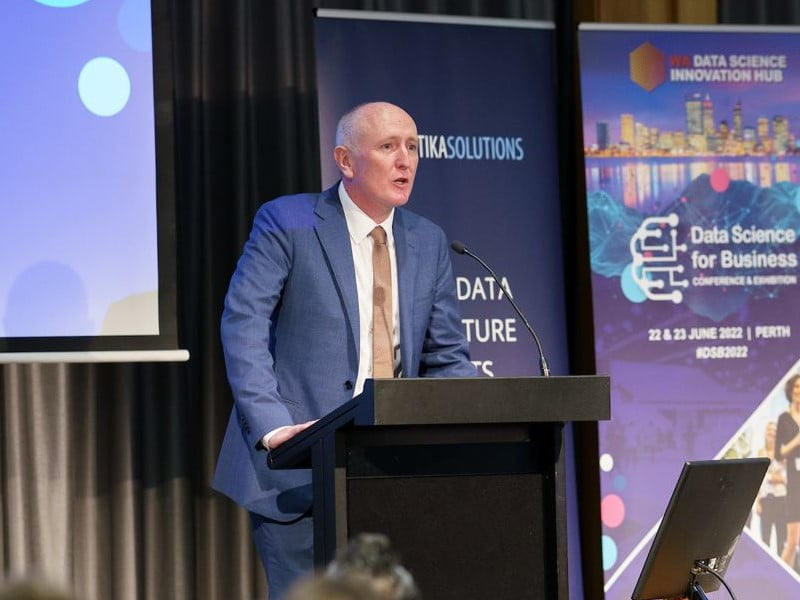The Western Australian Innovation and ICT Minister Stephen Dawson says the state needs at least 3,000 additional data scientists by 2030 to ensure the state’s economy remains globally competitive.
Speaking at the launch of the inaugural WA Data Science for Business Conference and Exhibition, Mr Dawson told attendees that the state would continue to support development in the area.
“Innovation in data science has only been made possible by providing greater support to our data science experts, academics, and businesses. And this is an area we must continue to focus on and remain competitive,” Mr Dawson said.
The two-day conference was organised by the WA Data Science Innovation Hub, a state partnership with Curtin University. Overall, the state government has committed $2.2 million to help support the hub, including $1.2 million over four years through the $16.7 million New Industries Fund.

InnovationAus.com asked the Minister to comment on ABS data that indicates expenditure on R&D at Western Australian state government owned organisations has declined by $25 million between financial year 2016-17 and 2020-21. In response, Mr Dawson said that he had not seen the data but that the government needed a clearer picture of what is being spent.
“I’ve not seen that ABS data and so I’d be interested to see it further. Certainly, from my perspective though, I’m very keen to understand what is being spent in this area and I’m not sure that as a government we really have a good handle on what is being spent. So certainly, I want to know, what is being spent so that we can continue to spend more and to focus on the areas that are most important,” Mr Dawson said.
Mr Dawson said that the state government is committed to reducing barriers to innovation in data science and machine learning.
“We sometimes see growth in this area impeded by limited access to infrastructure, important data not being released, and limited access to databases. The McGowan government is committed to introducing privacy and responsible information sharing (PRIS) legislation over the next year or so.
“The intention of that legislation is to establish a safe, privacy preserving environment that can help build citizen trust and provide the social licence required for government to share data for community benefit.”
The Innovation and ICT Minister previously told members of the Western Australian innovation ecosystem that he is willing to look at removing regulations if they would encourage more opportunities.
WA Data Science Innovation Hub Director Alex Jenkins said that he hopes to see a greater application of data science and artificial intelligence technology across the state. He urges businesses to consider data science not as a cost similar to running an email service, but as a way to create new market opportunities.
Mr Jenkins also noted the state currently lacks the skills needed to take full advantage of artificial intelligence.
“There is a need for more highly skilled data scientists across both government and business. One of the things that I would like to focus on is encouraging absolutely top tier talent to the state, putting WA on the map as somewhere where serious work is done in artificial intelligence,” Mr Jenkins said.
“One approach that we can take is we obviously can use the resources, expertise, and experience of the mining companies to help build that AI capability. Then we can use that to translate into other sectors.
“We can do better in Australia. There is much work we can do to help startups and also encourage students in terms of innovation and entrepreneurship, to take their ideas and build them into blossoming companies.”
He added support for the development of entrepreneurial talent in Australia would be through “tax incentives at the federal level” for tech companies and ensuring there is a “strong ecosystem at the local level”.
Director of the University of Western Australia’s Institute of Data Professor Eun-Jung Holden delivered a presentation on achieving industry outcomes from academic research. Speaking from her own experience of commercialising machine learning technology, Professor Holden she stressed the importance of industry-academia interactions.
“I think [the first lesson] is to identify research problems that are of value for industry. Meetings [such as hackathons] where industry and academia meet is very important for academics to be exposed to industry problems and industry to be exposed to the capabilities in academic institutions is very important,” Professor Holden said.
“Once the project is developed…you need to be working together in a way that academics go and sit in industry and see how end users actually do their task of interpretation. And of course, the mutual respect and benefits…are highlighted.”
Western Australia is also home to the Pawsey Supercomputer centre, which recently installed a the world’s first diamon-based quantum accelerator. Since 2016, the Western Australian state government has invested $26 million in the centre. The Australian Space Data Analysis Facility was opened in mid-2021 with state and federal funding. It uses the infrastructure to analyse satellite data on behalf of researchers and small to medium sized enterprises.
Do you know more? Contact James Riley via Email.

